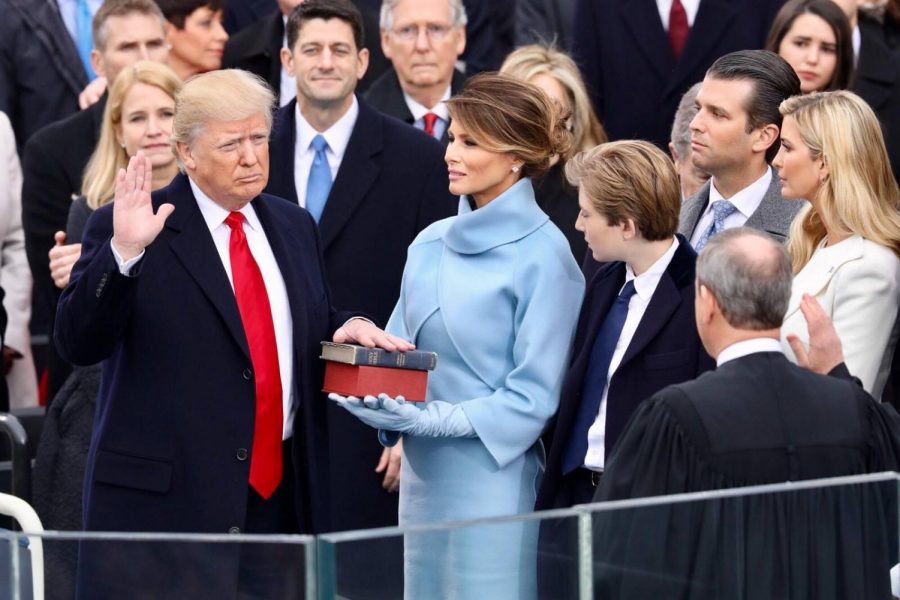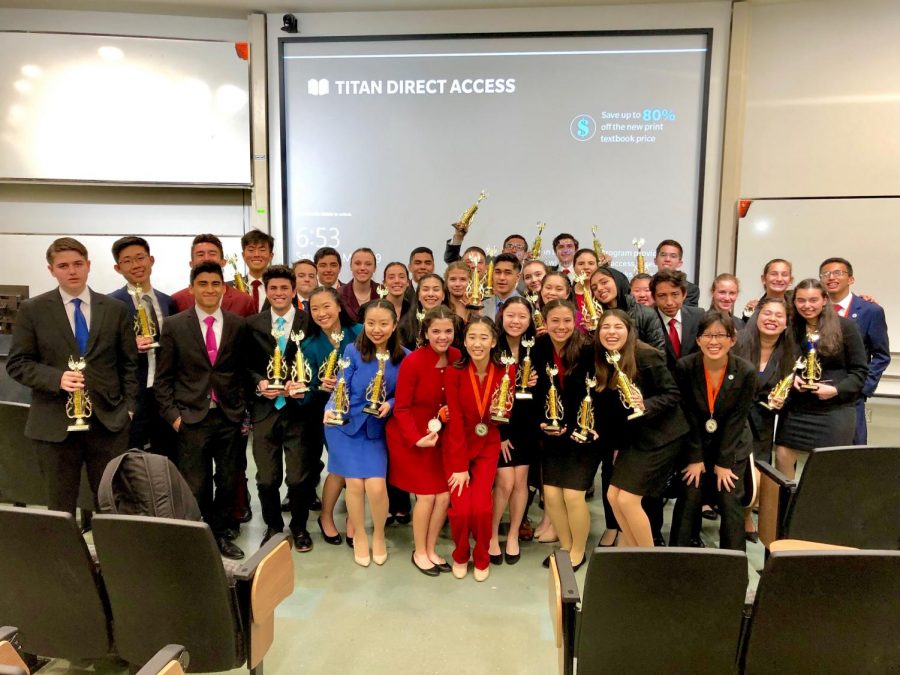It’s been less than a year that President Donald J. Trump has been in office. In just a year, thousands of articles have been published about him and his actions. They can be difficult to understand or believe, but a quick overview of major things Trump has done can epitomize the presidency so far.
Donald J. Trump takes the oath of office, Jan. 20. He immediately begins his role by signing two orders: to build the U.S./Mexico border wall and the “Muslim ban,” eliminating protections on illegal immigrants.
Senior Victoria Williams believes that Trump has good intentions, but the orders are wrong.
“I understand that he’s trying to put America first. But America is all about welcoming anyone who wants to be free. Yes, we should protect our citizens. Yes, we should protect our jobs. But anyone who wants to become an American citizen should have the right to become an American citizen. It’s what we’ve been about from the beginning,” Williams said.
In February, Trump appoints Betsy DeVos as Secretary of Education. Both sophomore Andrew Cisneros and junior Ryan Koh are skeptical of her.
“Betsy DeVos is supposed to help students succeed and help them reach their goals. But instead, she is making it harder for students to get into colleges and can hurt students with more debt than they already have,” Cisneros said.
“DeVos is a terrible cabinet addition,” Koh said. “Her push for privatization and choice schools that make profits is bad for the quality of all public schools, [and] the broader American public.”
Two days later, the Republican party reveals a new bill dismantling Obamacare, leaving 56 million people uninsured by 2026. This issue worries sophomore Joyesha Hudgins.
“I️ don’t have many thoughts other than the sufferings of those who, because of the Republican’s healthcare legislation, are lacking the needs they once had,” Hudgins said. “I️ just feel a sense of worry when I️ think about it.”
Several weeks later, FBI Director James Comey reveals that a Trump-Russia investigation is in place.
To begin April, Trump orders 59 Tomahawk cruise missiles on Syria in response to using chemical warfare.
“Yeah, it’s always dangerous, and yeah, we probably shouldn’t get involved in it. But if the U.S. doesn’t get involved, who will? I don’t know if it was necessarily the right thing to do, but someone needed to stop what was happening in Syria,” Williams said.
The first day of June, Trump withdraws from the Paris climate deal. June 12, an appeals court rules against the “travel ban.” The next day, former FBI director Robert Mueller begins another investigation on Trump.
Spontaneously, White House press secretary Sean Spicer resigns. Regarding the healthcare legislation, GOP Senator John McCain gives a crucial “no.” All while Trump’s approval rating sinks to 39%, lower than any president in 70 years.
Relations with North Korea have always been uneasy, but, in August, the U.S. tests the Intercontinental Ballistic Missile (ICBM) in response to North Korea’s second ICBM test.
One student believes the tensions are rising.
“Kim Jong Un and Trump’s relationship is hostile, with both men having access to nuclear weapons,” sophomore Andrew Cisneros said. “The tension between them that Trump is trying to get rid of can be very dangerous, especially recently with Trump calling Kim Jong Un ‘short and fat,’ can make these two powerful individuals go against each other with Trump’s ego and Kim Jong Un’s thirst for power.”
A white nationalist rally at Charlottesville, Virginia makes headlines, and Trump condemns racism and alt-right groups. However, he makes a second statement that “both sides” are to blame.
“As a person that’s not fully white, I️ was very saddened by the news by Charlottesville, especially since it happened after all this change of equality like for gay marriage and having the first African American president,” Hudgins said. “I️ feel like it’s slowly unraveling the equality and peace our country.”
Just days later, Trump revokes Obama’s Deferred Action for Childhood Arrivals (DACA). Junior Evelyn Arceo does not appreciate this act.
“The thing that upsets me the most about the revoke of DACA is that the young adults that really need this aren’t criminals—they’re students. People who want to go to college and make something good of themselves are now in fear of getting deported,” Arceo said.
The controversial Take a Knee movement ignites as well, causing Trump to suggest firing the kneeling NFL players.
Arceo does not feel Trump’s response was necessarily appropriate.
“I don’t think it’s acceptable the way Trump reacted to the Take A Knee movement. He’s the leader of a nation, a big one at [that], and his focus should be on the hundreds of other problems going on in America, not cursing out athletes,” Arceo said.
The president’s approval rating declines to 34%, one of the lowest ever.
Koh believes it’s a good thing Trump’s rating is dropping.
“I appreciate it if people are truly changing their minds about our president, but the worst of his supporters (neo-nazis and white supremacists) will continue to feed off of Donald Trump in negative ways that will divide the nation,” Koh said. “At some point you have to realize being on the same side as a neo-nazi or white supremacist probably isn’t the most moral decision.”
Cisneros is skeptical of Trump’s presidency so far.
“I don’t think he [has] had a successful presidency, with the public and news networks despising him and going against him with extreme coverage of him and consistent protests,” Cisneros said. “Trump hasn’t exactly performed well under pressure and often has made bad decisions with the U.S.”
Whether it was arguably beneficial or not, Trump has undoubtedly brought on change since his election last November.






